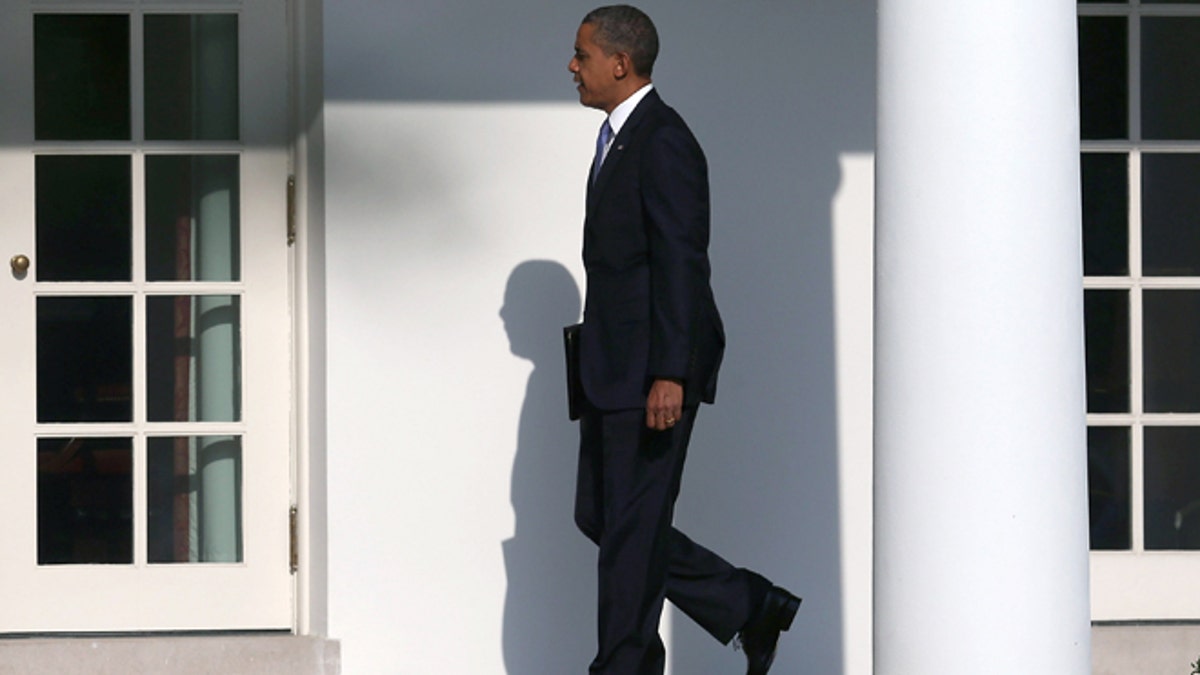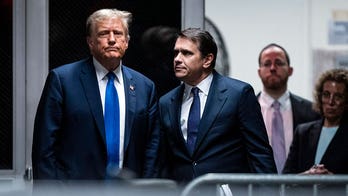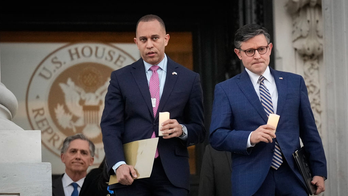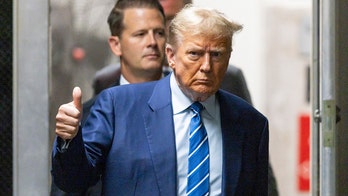
WASHINGTON, DC - AUGUST 21: U.S. President Barack Obama walks toward the Oval Office before departing on Marine One at the White House, on August 21, 2012 in Washington, DC. President Obama is traveling to Ohio, Nevada and New York to continue campaigning. (Photo by Mark Wilson/Getty Images) (2012 Getty Images)
There are no signs that the United States will be saved from going over the so-called fiscal cliff, resulting in large tax hikes, but still Congressional leaders and President Barack Obama will meet Friday afternoon in an 11th-hour scramble in the hopes of a limited fiscal deal before the New Year.
The scheduled meeting, the first since Nov. 16, stands as a make-or-break moment for negotiations to avoid across-the-board tax increases and deep spending cuts.
Obama called for the meeting as top lawmakers alternately cast blame on each other while portraying themselves as open to a reasonable last-minute bargain.
Republicans aren't about to write a blank check for anything the Democrats put forward just because we find ourselves at the edge of the cliff.
Senate Democratic Leader Harry Reid all but conceded that any effort at this late date was a long shot. "I don't know timewise how it can happen now," he said.
For Obama, the meeting represented a test of how he would balance the strength derived from his re-election with his avowed commitment to compromise. Despite early talk of a grand bargain between Obama and House Speaker John Boehner that would reduce deficits by more than $2 trillion, the expectations were now far less ambitious.
Although there were no guarantees of a deal, Republicans and Democrats said privately that any agreement would likely include an extension of middle-class tax cuts with increased rates at upper incomes, an Obama priority that was central to his re-election campaign. The deal would also likely put off the scheduled spending cuts. Such a year-end bill could also include an extension of expiring unemployment benefits, a reprieve for doctors who face a cut in Medicare payments and possibly a short-term measure to prevent dairy prices from soaring, officials said.
To get there, Obama and Reid would have to propose a package that Senate Republican Leader Mitch McConnell would agree not to block with procedural steps that require 60 votes to overcome.
Speaking on the Senate floor Thursday, McConnell cautioned: "Republicans aren't about to write a blank check for anything the Democrats put forward just because we find ourselves at the edge of the cliff."
Nevertheless, he said he told Obama in a phone call late Wednesday that "we're all happy to look at whatever he proposes."
If a deal were to pass the Senate, Boehner would have to agree to take it to the floor in the Republican-controlled House.
Boehner discussed the fiscal cliff with Republican members in a conference call Thursday and advised them that the House would convene Sunday evening. Rep. Tom Cole, R-Okla., an ally of the speaker, said Boehner told the lawmakers that "he didn't really intend to put on the floor something that would pass with all the Democratic votes and few of the Republican votes."
But Cole did not rule out Republican support for some increase in tax rates, noting that Boehner had amassed about 200 Republican votes for a plan last week to raise rates on Americans earning $1 million or more. Boehner ultimately did not put the plan to a House floor vote in the face of opposition from Republican conservatives and a unified Democratic caucus.
"The ultimate question is whether the Republican leaders in the House and Senate are going to push us over the cliff by blocking plans to extend tax cuts for the middle class," White House communications director Dan Pfeiffer said. "Ironically, in order to protect tax breaks for millionaires, they will be responsible for the largest tax increase in history."
Boehner, McConnell, Reid and House Democratic Leader Nancy Pelosi are all scheduled to attend Friday's White House meeting with Obama. Vice President Joe Biden will also participate in the meeting, the White House said.
Despite the urgency to act, the rhetoric Thursday was quarrelsome and personal.
The House of Representatives is "being operated with a dictatorship of the speaker," Reid said on the Senate floor. He attributed Boehner's reluctance to put a version of Senate bill that raised tax rates on incomes above $250,000 for couples to fears he could lose his re-election as speaker next week.
"Harry Reid should talk less and legislate more if he wants to avert the fiscal cliff," countered Brendan Buck, a spokesman for Boehner.
If a deal is not possible, it should become evident at Friday's White House meeting. If that occurs, Obama and the leaders would leave the resolution to the next Congress to address in January.
Such a delay could unnerve the stock market, which performed erratically Thursday amid the developments in Washington. Economists say that if the tax increases are allowed to hit most Americans and if the spending cuts aren't scaled back, the recovering but fragile economy could sustain a traumatizing shock.
But a sentiment is taking hold that despite a black eye to its image, Congress could weather the fiscal cliff without significant economic consequences if it acts decisively next month.
"Going over is likely because at this point both sides probably see a better deal on the other side of the cliff," Jared Bernstein, Biden's former economic adviser, wrote in a blog post Thursday.
By letting current tax cuts expire and rise, Bernstein and others say, Republicans would be voting to lower taxes next month, even if not for all taxpayers. Democrats — and Obama — would be in a stronger position to demand that taxpayers above the $250,000 threshold pay higher taxes, instead of the $400,000 threshold that Obama proposed in his latest offer to Boehner.
And the debate over spending cuts, including changes to politically sensitive entitlement programs such as Medicare, would have to start anew.
Reporting by The Associated Press.
Follow us on twitter.com/foxnewslatino
Like us at facebook.com/foxnewslatino




